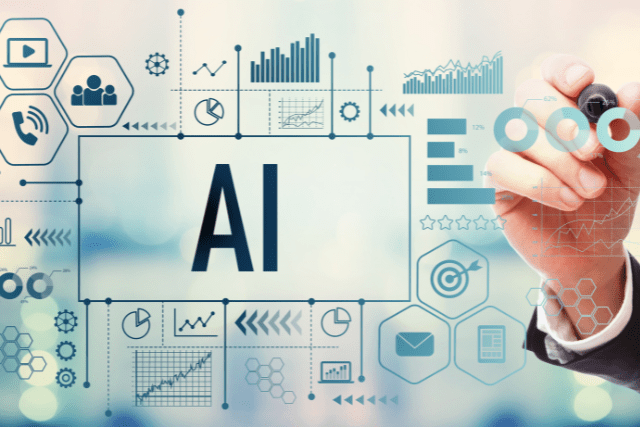The world of ecommerce is rapidly evolving as technology continues to advance. Artificial intelligence (AI) and machine learning are now playing a major role in the success of online businesses, unlocking new opportunities for growth. As AI-powered automation solutions continue to be developed, companies can now use the power of data-driven insights to gain valuable business insights and optimize operations. In this article, we explore how AI is revolutionizing the ecommerce industry and empowering businesses to reach their full potential.
Today’s ecommerce landscape is driven by predictive analytics and personalized experiences powered by AI. From automated customer support agents that respond to inquiries quickly, to powerful recommendation engines that suggest products customers may be interested in — AI helps create meaningful connections between brands and customers while providing a more efficient shopping experience overall.
Advantages of AI in E-Commerce
By leveraging the power of artificial intelligence (AI) in their ecommerce strategies, businesses can gain a range of advantages that can help them succeed and stay ahead of the game. The advantages offered by AI are far reaching and include:
- Improved customer analytics
- better personalization capabilities,
- predictive analysis for sales forecasting
- marketing optimization.
With these insights businesses can optimize product pricing, inventories and promotions to benefit their bottom line.
Additionally, machine learning algorithms can be used to provide personalized recommendations based on customer purchasing history which helps increase engagement with customers as well as sales conversions.
AI-powered chatbots are also proving beneficial in providing customers with better service experiences by responding quickly to inquiries or providing helpful information about products or services.

How E-commerce AI is Transforming Business
As technology advances, ecommerce AI is becoming an increasingly important factor in the success of businesses today. Whether it’s personalizing customer experiences or informing business decisions, artificial intelligence (AI) can help companies make better use of their data and resources to increase profits.
Automated Customer Service
The rise of eCommerce has transformed how companies do business, allowing them to reach customers around the world and maximize their sales potential. This transformation is being taken even further with the introduction of Artificial Intelligence (AI) into customer service operations. AI-driven customer service can automate various tasks, such as responding to FAQs or providing basic assistance without requiring human intervention.
Automated workflows.
Ecommerce is one of the fastest growing and most competitive industries, making it difficult for businesses to stay ahead of their competition. By leveraging AI technology, companies can automate workflows, reduce costs and create new revenue streams in order to unlock their business potential.
AI-driven automation enables companies to streamline operational processes while reducing complexity that often results from manual labour. For example, automated workflows allow businesses to quickly respond to customer inquiries or complaints without any human intervention. Automated workflow systems also provide powerful data analysis capabilities which allow businesses to make more informed decisions about their operations and strategies. This makes it easier for them to identify opportunities for growth and better serve their customers.
Overall, automated workflows are an invaluable tool for ecommerce businesses as they help increase efficiency and secure a competitive advantage in the market.
AI-powered chatbots
AI-powered chatbots are revolutionizing the way businesses engage with customers. These automated conversational agents allow companies to respond to customer inquiries quickly and efficiently, while providing a personalized experience. By leveraging Artificial Intelligence (AI) technology, businesses can create bots that accurately understand customer queries and respond in natural language.

Through AI-driven technologies such as natural language processing and machine learning, chatbot systems are able to learn from user interactions over time. This allows them to provide increasingly accurate responses as they gain more information about each conversation. With the ability to answer questions 24/7, chatbots help boost efficiency by reducing wait times for customers and freeing up staff resources for more complex tasks. Additionally, AI-powered chatbots can be integrated with ecommerce systems for a more seamless shopping experience for online shoppers.
Interactive Voice Response (IVR)
Interactive Voice Response (IVR) systems are one of the most powerful tools in digital commerce. This technology allows businesses to unlock their potential by automating customer service and streamlining sales processes. With an IVR system, customers can make purchases or access information quickly and conveniently, without having to wait on hold for a customer service representative.
IVR systems use artificial intelligence (AI) technologies such as natural language processing (NLP), machine learning (ML), and advanced algorithms to interpret customer input from various types of voice commands. This enables companies to provide better experiences for their customers by anticipating their needs and offering more personalized services.
By utilizing AI-driven IVR systems, businesses can offer more efficient customer support services, automate sales processes, and increase overall customer satisfaction levels. Email automation.
Self-service help centers.
Self-service help centers are becoming increasingly popular as companies look to reduce costs and improve customer service. By allowing customers to access information on their own, these centers can provide valuable insights into customer behavior, enabling businesses to make more informed decisions about their products and services. In addition, self-service help centers can leverage AI technology to make the process even smoother for customers.
AI-powered self-service help centers offer businesses a number of benefits. They provide cost savings by reducing the need for staff members in certain areas, while also offering improved customer experiences through personalized support services. Additionally, they enable businesses to better understand user behavior by analyzing data collected from customer interactions. This data can be used to develop targeted campaigns and offers based on identified customer preferences or needs, leading to increased sales opportunities and improved customer retention rates.
Frequently Asked Questions (FAQs)
Frequently asked questions (FAQs) are an important part of any customer service strategy, and AI-based solutions can often answer them quickly and accurately. The automated customer service solutions include comprehensive FAQs databases, which can be customized to match the specific needs of your business. A dedicated FAQ management team can also be hired to update the system based on frequent questions and common concerns raised by customers.
Predictive Analytics
Predictive analytics is revolutionizing the ecommerce industry. The ability to analyze customer data to better anticipate the needs of consumers has led to the development of artificial intelligence (AI) systems that can automatically adjust products and services to meet demand. AI-driven ecommerce insights are enabling businesses to drive sales, create more personalized offerings and gain a competitive edge in their respective industries.
By leveraging predictive analytics, businesses can see what customers will purchase in the future based on current trends and patterns. This helps them make decisions about which products or services should be available for sale, as well as how much inventory should be kept in stock.
By utilizing AI algorithms, companies can also collect information on customer behavior from various sources such as web browsing history and social media activity, allowing them to tailor product offerings with greater accuracy than ever before.

Personalization & Targeted Ads
Personalization & Targeted Ads are becoming an essential part of the ecommerce industry. With the rise of AI, companies are now able to tailor their ads to specific customers based on their preferences and past purchases. This allows for a more customized shopping experience that meets the needs of each individual customer.
AI helps businesses reach far more potential customers than ever before by segmenting customers into various groups based on interests and buying habits. Companies can then target those groups with personalized ads tailored specifically to them, increasing chances of sales conversions and customer loyalty. AI technology also enables real-time analysis that provides insights into customers’ behaviors and preferences, allowing retailers to adjust advertising campaigns in order to maximize their results.
As AI continues to evolve, it is becoming increasingly important for ecommerce businesses to take advantage of targeted ads and personalization technologies to stay ahead in today’s competitive market.
Automating Inventory Management
Businesses in the ecommerce industry are increasingly turning to automated inventory management. With Artificial Intelligence (AI) and Machine Learning (ML), businesses can keep track of stock, predict customer trends, and make more informed decisions. This technology is transforming the way businesses manage their inventory, making it easier than ever before to stay on top of stock levels.
AI-driven systems are able to provide real-time feedback on inventory levels and customer demand, allowing businesses to adjust their stock quickly. By utilizing predictive analytics, these systems can anticipate future sales patterns and suggest when new orders should be placed. In addition, AI can also optimize warehouse operations by automating processes such as order picking and packing for faster fulfillment speeds.
Improving Product Delivery Processes
AI is transforming the way products are delivered to customers, allowing organizations to improve their product delivery processes. By leveraging AI technologies such as machine learning algorithms and computer vision, companies can increase the accuracy of order fulfillment while reducing cycle times. This leads to improved customer experiences, better inventory management, and optimized delivery schedules.
AI-enabled solutions can automate mundane tasks such as scanning barcodes or identifying discrepancies in order details; this helps reduce manual errors that often occur with traditional product delivery methods. Additionally, AI-based systems have access to more data points than ever before which allows them to identify potential risks or delays earlier in the process for faster resolution.
The Live Shopping Revolution: How AI Drives Brands
Artificial intelligence (AI) is now driving brands to provide an even greater level of personalization and convenience when it comes to shopping experiences. Through AI-powered tools, businesses can better understand their shoppers and tailor products accordingly, resulting in a more engaging customer journey.
The introduction of AI into the ecommerce sector has caused a paradigm shift in the way online shopping works; by analyzing previous customer data, retailers can predict what other shoppers may be interested in buying. By leveraging this technology, brands are able to create tailored recommendations based on individual preferences and past purchasing behaviors, increasing engagement and improving conversions.
Visual and voice search
Visual and voice search have become increasingly popular in the ecommerce space. With advances in artificial intelligence, more companies are investing in these technologies to improve the customer experience. AI-powered visual and voice search can not only help customers find what they need quickly, but they can also provide customers with personalized recommendations based on their individual preferences.
Using AI for visual and voice search makes it easier for customers to shop online by providing them with a more intuitive experience. As customers’ expectations continue to evolve, businesses must keep up with technological advancements or risk losing out on potential sales opportunities.
By leveraging AI-driven visual and voice search solutions, companies can better understand their customers’ needs and offer a range of tailored products or services that satisfy each individual’s desires. This will ultimately increase customer loyalty and drive higher conversion rates for businesses.
Up-sell and cross-sell loyal customers
Up-sell and cross-sell loyal customers is an essential component for any successful ecommerce business. With the help of Artificial Intelligence (AI), businesses can now identify and target their most loyal customers, giving them the opportunity to increase sales by offering special incentives or discounts to keep them engaged.
AI can provide detailed insights into customer preferences, allowing businesses to tailor offers that are specifically designed to appeal to each individual customer’s needs. This will ultimately result in higher conversion rates and increased revenue for the business.
By leveraging AI technology, businesses can take advantage of automated marketing campaigns which identify potential buyers and reach out with personalized messages based on their preferences, interests and past purchases. This makes it easier for businesses to build relationships with their existing customers while also helping them acquire new ones.

Challenges in Adopting AI
Businesses are leveraging AI to gain an edge in a competitive landscape and stay ahead of their competitors. However, while the benefits of AI are clear, many organizations still face challenges when it comes to adopting this innovative technology.
AI requires significant investments in terms of both time and money for successful implementation and maintenance. Companies need to be able to access large amounts of data, develop algorithms, and have a team skilled in machine learning or natural language processing (NLP). Training existing staff can be costly, as well as finding qualified professionals who understand how AI works and how it can be used within the organization.
Additionally, companies must consider security issues related to storing large amounts of sensitive customer data that is being used for automated processes.
Understanding the AI Revolution
The AI revolution is the unstoppable force driving digital innovation and transforming how businesses operate. As technology advances, artificial intelligence (AI) has become increasingly important to unlocking business potential with ecommerce – from streamlining customer service to creating personalized experiences. AI offers a range of tools that allow companies to improve efficiency, reduce costs and maximize profits in the digital world.
By understanding how best to use AI for ecommerce, businesses can benefit from data-driven insights that optimize their operations, automate their processes and develop innovative products and services. With AI, organizations can leverage customer data to better understand user preferences, personalize communication channels and anticipate customers’ needs before they arise.
By empowering employees with intelligent automation tools, businesses can drastically reduce time-consuming manual processes while improving accuracy and scalability.
Overcoming Budget Constraints
It is essential to have a well-defined budget strategy that prioritizes investments in customer experience as well as intelligent automation solutions. This will help to ensure that resources are allocated efficiently and that the company’s goals are met without exceeding financial limits.
Companies should look for cost-effective solutions such as open source software or cloud computing services. By leveraging these options, organizations can maximize their return on investment while staying within budget constraints.
Overcoming Data Collection Challenges
Data collection is an essential component of any business’s success, particularly in the ever-evolving world of ecommerce. Despite its importance, many companies are finding it difficult to collect and utilize the data that they need to maximize potential growth. Fortunately, AI solutions can help businesses overcome these challenges and unlock their full potential with ecommerce.
AI offers a wide range of benefits for data collection, including automated processes that reduce human error and provide more accurate information. This technology can also identify patterns in customer behavior or web traffic that would be impossible to detect manually.
AI solutions can be integrated into existing systems so businesses don’t have to purchase new hardware and software platforms – something which was once required when collecting data on an enterprise level.
Addressing Security and Privacy Concerns
Online security is paramount for any ecommerce business, so it’s essential that companies have measures in place to protect consumer data across all platforms. AI can be used to detect suspicious activity on websites or apps and alert the appropriate parties. Additionally, AI-powered analytics can help identify areas of improvement that could make the customer experience safer and better overall.
Privacy is another concern when it comes to embracing AI technology. Companies should ensure they comply with local regulations regarding data usage and take steps to ensure customer’s information remain secure at all times. Provide support and training As AI technology becomes more sophisticated, it’s important to provide sales and customer service representatives with the necessary tools to deliver a high-quality experience.
Identifying Use Cases for AI in ECommerce
It is important to identify use cases for AI in ecommerce. From automated customer support chatbots to product recommendation engines, AI can help businesses create personalized experiences that drive conversions and maximize profits. With its ability to analyze large amounts of data and identify trends quickly, AI presents exciting opportunities for ecommerce business owners who are looking to stay ahead of their competition. To unlock the full potential of AI in ecommerce, it’s important to consider which use cases may be most relevant for your business.
Developing a Robust Infrastructure for AI
Developing a robust infrastructure for AI is an essential part of unlocking business potential with ecommerce AI. To create a system that can easily and effectively integrate the latest artificial intelligence technology, companies must ensure they have the right resources in place. This includes comprehensive data collection, digital infrastructure, and modern tech solutions.
To begin building a robust infrastructure for AI, companies should first focus on creating reliable data sets that accurately reflect their customer base. They need to capture user behaviors, patterns, and preferences across all channels to gain valuable insight into their customers’ needs. With this information at hand, businesses can develop targeted marketing campaigns and personalize experiences based on customers’ past interactions.
Next, businesses must invest in digital infrastructures that are capable of supporting new technologies like machine learning – such as cloud computing services or dedicated hardware for advanced analytics platforms.
Integrating AI Solutions into Existing Systems
Integrating AI solutions into an existing system provides several key benefits that can help boost business productivity and profitability. By streamlining processes with automation, businesses can accelerate production times while also increasing accuracy.
With access to data insights, companies are able to make decisions based on real-time information rather than relying on guesswork or intuition. This improved visibility allows businesses to stay ahead of trends and better understand customer needs so they can adjust their strategies accordingly.
Conclusion
The use of artificial intelligence (AI) in e-commerce has been steadily increasing and is expected to expand further in future. AI can help unlock the true potential of an e-commerce business, leading to better customer experiences and improved bottom lines. In this article, we have explored how businesses are utilizing AI for their e-commerce operations, and what results they have achieved so far.
AI offers a wide range of benefits for e-commerce businesses that can’t be ignored. Companies need to deploy the right combination of technologies such as machine learning and natural language processing to take advantage of these opportunities. With proper implementation and utilization, organizations can harness the power of AI and improve customer experience, increase sales revenues, reduce operational costs, build competitive advantages in their marketplaces, turn data into insights — making them more efficient than ever before.







